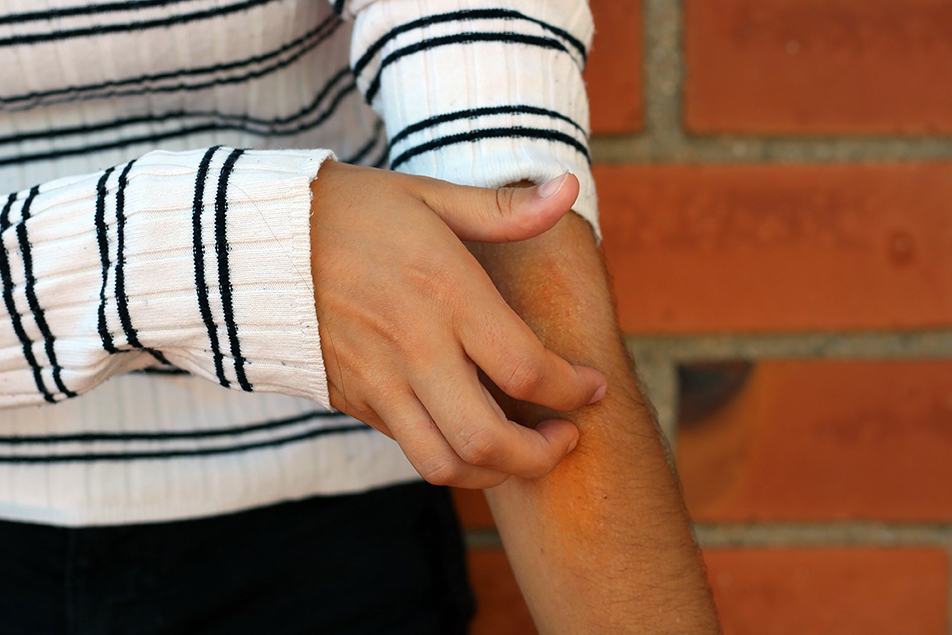
Do you have dry, itchy, inflamed skin? You may not realize it, but you could be dealing with more than just a minor skin irritation. Eczema is a common, noncontagious skin disorder that can affect anyone at any age. Holli Zeedyk, NP, PPG – Dermatology, Renew Aesthetics, helps explain the common causes of this chronic condition and the best ways to manage it.
What is eczema?
Eczema, also known as atopic dermatitis, is a chronic skin condition that causes dryness, itching and a rash. It can occur anywhere on the skin from head to toe and may present shortly after birth, with its severity ranging from minimal to severe. Most children outgrow it by adolescence, but some people may continue to struggle with the condition into adulthood. In some cases, eczema can also begin in adolescence or adulthood and is referred to as the “itch that rashes” because it’s common for the itching to precede rash symptoms. Eczema can also appear along with asthma and environmental allergies, or atopic triad, which can signify increased skin sensitivity with an impaired skin barrier.
What causes eczema?
While there’s been plenty of research on eczema and more continues to occur, we aren’t exactly sure what causes it. However, several factors can contribute to the condition, including:
- Genetics: If a parent, sibling or other close relative has had issues with eczema, then chances are you may have it, too.
- Environmental exposures: Irritants in the environment, such as harsh soaps, chemicals, grass, plants, exposure to tobacco smoke, or even air pollution, can aggravate eczema.
- Immune system: An overly reactive immune system can increase eczema chances.
- Stress: How our bodies respond to stressful situations (physically and emotionally) can influence eczema and trigger bouts with the condition.
What treatment options are there for people living with eczema?
Treatment options for eczema can vary depending on the severity of the symptoms. Avoiding triggers, treating the skin gently and moisturizing daily is at the core of managing the condition. Other non-medication treatments can include wet wraps and special bathing techniques to help add moisture to the skin while reducing irritating bacteria on the surface. UVB phototherapy, in very limited and monitored doses, is also known to help those suffering from eczema.
When these methods are insufficient, prescription medications may become necessary to manage symptoms. This could include topical steroid and non-steroid creams that help reduce inflammation and skin symptoms. For those with concurrent asthma and allergies, antihistamines and asthma medications may also benefit skin symptoms. For more complex cases, providers may prescribe short-term courses of oral steroids and/or antibiotics.
Additionally, there is now an injectable medication that works well to control symptoms for those with moderate to severe eczema and can also help individuals with asthma. This injectable medication has been a game changer for those with difficult-to-control eczema, helping everyone from the very young to adults and the elderly.
Can this condition be prevented?
Unfortunately, you can’t completely prevent eczema because there is no cure. But, treatment can help control aggravating symptoms and minimize flare-ups. Triggers for flare-ups are different for every person. By tracking and avoiding things that cause increased symptoms, a person can learn to manage their condition better. Developing and following a skincare routine and treatment regimen with the help of a provider are critical in eczema management.
What are some do’s and don’ts associated with the condition?
If you or a loved one suffer from eczema, there are irritants you should try to avoid to reduce the occurrence of flare-ups. Some common triggers can include:
- Overheating
- Fragrances
- Harsh soaps and detergents
- Perfumes and dyes
- Irritating and synthetic fabrics
- Itching and rubbing the skin
- Hot water in the shower or bath
Additionally, there are precautions you can take to prevent eczema flares. Try incorporating a few of these tips to reduce occurrences.
- Keep shower and bath water lukewarm to avoid over-drying the skin.
- When drying off after bathing, pat the skin dry. Do not rub!
- Moisturize at least twice a day, every day. Preferably with a cream, not lotion.
- Use products for sensitive skin free of dyes, scents and perfumes.
- Keep the skin cool and sweat-free as much as possible.
- Drink plenty of water to keep the skin hydrated from the inside out.
- Wear gloves when cleaning and working with water or anything wet.
- Design a skincare routine with your provider and follow it.
- Use your medications as directed, if prescribed.
- Learn to manage your stress.
Where to turn for help
If you or a loved one have symptoms of eczema or another dermatologic condition, please speak with your primary care provider or schedule an appointment with a dermatologist to find a treatment regimen that is right for you.